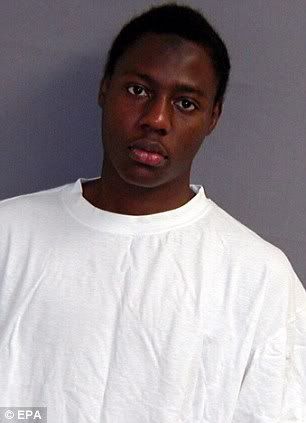
AbdulMutalab son of a Nigeria banker.Went to Yemen to study language and later trained by AL Qeada to use PETN bom.Dad already inform and warn authorities in Nigeria about his son radical views before the sucidal attempt.
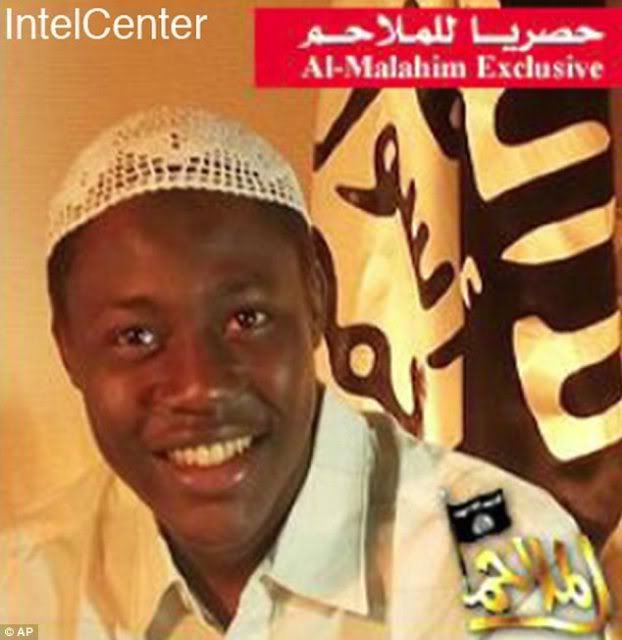
AbdulMutalab went to Yemen to study but make contact with Al Qeada believe train him to use PETN.
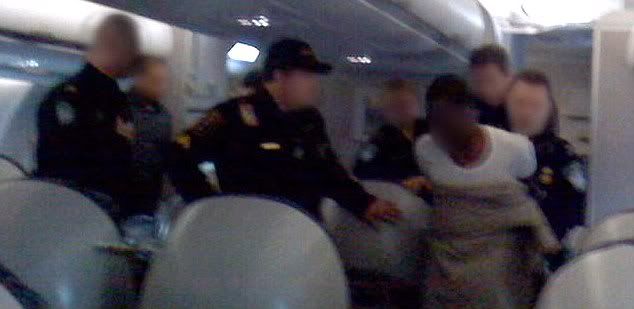
AbdullahMutalib failed to ignite the PETN bom strapped in his underwear.Injected a syringe into the underwear but no explosion but badly burn leg.Later jump by a passenger.
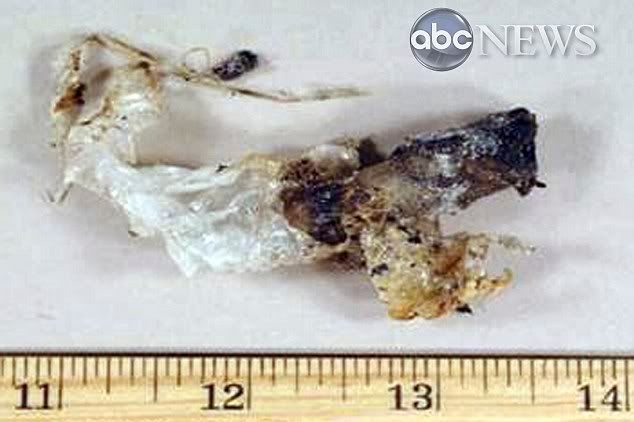
Pieces of underwear containing the PETN.
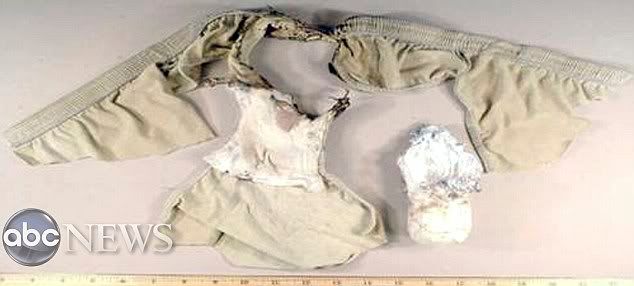
PETN package inside the terrorist underwear that fail to explode instead badly burn AbdulMutalib leg.
The U.S. government had enough information about a Nigerian man and an al Qaeda's cell in Yemen to potentially disrupt their alleged plot to blow up a passenger jet on Christmas Day, a White House review found.
Here's what U.S. spy agencies and the State Department knew about the accused bomber, Umar Farouk Abdulmutallab, and the growing threat posed by al Qaeda in the Arabian Peninsula, in the months before the attempted December 25 bombing:
NATIONAL SECURITY AGENCY
About four months before the attempted bombing on December 25, the NSA intercepted telephone conversations in which the leaders of al Qaeda in the Arabian Peninsula talked about the possibility of using an unidentified "Nigerian" bomber in an attack, according to intelligence officials. John Brennan, President Barack Obama's top White House adviser on counterterrorism, said the intercepts were shared with the National Counterterrorism Center.
WHITE HOUSE
The flow of intelligence picked up between mid-October and late December, but U.S. counterterrorism officials learned as early as August how effective al Qaeda in the Arabian Peninsula had become at concealing the explosive PETN, known as pentaerythritol, in the undergarments of would-be suicide bombers.
The intelligence stemmed from al Qaeda's attempted assassination on August 27 of Prince Mohammed bin Nayef, who heads Saudi Arabia's anti-terrorism campaign.
Brennan, who visited Saudi Arabia less than a week after the attack, said the United States worked with the Saudis to gather intelligence about al Qaeda's use of PETN but added: "There was nothing in that assassination attempt against Prince Mohammed bin Nayef that indicated aviation was a target."
The PETN hidden in Abdulmutallab's underwear failed to detonate.
CENTRAL INTELLIGENCE AGENCY
The CIA first learned of Abdulmutallab on November 18, when his father came to the U.S. Embassy in Abuja, Nigeria, to voice concerns that his son may have come under the influence of militants and had planned to travel to Yemen.
The CIA said it worked with the embassy to add Abdulmutallab and his possible Yemeni contacts to the U.S. terrorism database and forwarded biographical information about him to the National Counterterrorism Center.
Critics say the CIA should have done more to flag the intelligence.
The White House said: "Though this information alone could not predict Mr. Abdulmutallab's eventual involvement in the attempted 25 December attack, it provided an opportunity to link information on him with earlier intelligence reports that contained fragmentary information."
STATE DEPARTMENT
U.S. diplomats also took part in the November 18 meeting with Abdulmutallab's father in Abuja and forwarded the information by unclassified cable to the National Counterterrorism Center on November 20. But officials said the information was deemed insufficient to revoke Abdulmutallab's U.S. visa.
Department officials argue that they generally rely on an interagency screening system to advise if visas should be revoked on security-related grounds, and that no such recommendation was made in this case.
Critics also say the State Department should have been alert to the threat after Britain denied Abdulmutallab a student visa to attend a bogus institution. U.S. officials say British authorities never informed them that the visa was denied, although they describe cooperation between the two countries since the incident as "seamless."
OFFICE OF THE DIRECTOR OF NATIONAL INTELLIGENCE AND THE NATIONAL COUNTERTERRORISM CENTER
The Director of National Intelligence is ultimately responsible for integrating foreign, military and domestic intelligence. For months, DNI Dennis Blair and CIA Director Leon Panetta have waged a behind-the-scenes turf battle over Blair's role, but the White House and intelligence officials say the DNI, the CIA and other intelligence agencies shared information as they were supposed to.
Telephone intercepts and biographical information from the NSA and the CIA were shared with the National Counterterrorism Center, which was established in 2004 to serve as the main repository for counterterrorism intelligence gathered by more than 16 agencies. Critics say the center did not "connect the dots" as it was designed to do.
Lawmaker demand more security changes after failed attempt by suicidal person on US Flight.
President Obama's push to revamp the terror watch list, improve airport screening and hold the intelligence community more accountable for tracking suspects does not go far enough, some lawmakers say, arguing that more specific steps need to be taken to avoid a repeat of the attempted Christmas Day bombing.
President Obama's preliminary review of the attempted Christmas Day airline bombing would "shock" Americans, the most startling aspect of it may have been that the administration was pledging to do what seemed obvious to many -- at least in hindsight.
The president's push to revamp the terror watch list, improve airport screening and hold the intelligence community more accountable for tracking suspects had some lawmakers saying on Friday that the administration must offer more specific steps if it hopes to avoid a repeat of the alleged plot to blow up an international flight heading to Detroit.
"The president says we're going to have smart, sensible screening at airports. You know what? I hope so. It's about time," Rep. Eric Cantor, R-Va., told Fox News on Friday.
Lawmakers applauded the administration for the swift steps it has taken in response to the attempted bombing, but they are calling for additional, more specific changes in the months ahead.
Maine Sen. Susan Collins, ranking Republican on the Senate Committee on Homeland Security and Governmental Affairs, said the State Department should suspend the visas of everybody in the terror database -- which contains more than a half-million people -- pending "further investigation." The Christmas Day suspect, Umar Farouk Abdulmutallab, had been in that database, but was not moved to any smaller list that would have required secondary airport screening or prohibited him from flying. His visa, meanwhile, was never revoked.
Collins also said the Department of Homeland Security should expand programs to verify that all foreigners flying to the United States have valid visas.
"If the State Department had cancelled Abdulmutallab's visa, he would never have been permitted to board his flight in Amsterdam," she said in a written statement.
Sens. Lindsey Graham, R-S.C., and John McCain, R-Ariz., wrote a letter to Obama urging him not only to halt the transfer of Guantanamo detainees to Yemen, but to all "countries with a significant Al Qaeda presence."
They listed Afghanistan, Pakistan, Saudi Arabia, Somalia, Algeria and Sudan among them.
Sen. Dianne Feinstein, D-Calif., chairwoman of the Senate Intelligence Committee, already had warned the administration that the standards for watchlisting suspected terrorists are "too restrictive."
She urged the president in a recent letter to loosen the standards so that anyone "reasonably believed" to be connected with a terrorist group would be added to a watchlist and denied a visa.
It doesn't appear as if Obama's policy recommendations go that far -- at least not yet.
The administration, which has already started to expand the no-fly list, plans to conduct a "thorough review" of the terror database and review the visa status of those on it. It plans to review whether any "adjustments" are needed and also to review criteria for issuing visas.
The Obama administration has instituted a series of other changes since the failed attack two weeks ago. The Transportation Security Administration has called for extra screening for U.S.-bound flights at airports in 14 countries of interest; the State Department is changing the way it notifies other agencies about terror suspects; and the administration is halting the transfer of Guantanamo Bay detainees to Yemen, where Abdulmutallab visited before the attempted bombing.
The changes announced Thursday were a bit more vague. The administration pledged to pursue "enhanced screening," improve the "rigor and raise the standard of tradecraft of intelligence analysis," assign specific responsibility for certain terror suspect cases and establish a process for prioritizing cases, along with the review of the visa and watchlist system.
The recommendations came after a two-week review that found multiple shortcomings in the intelligence community. Obama said the information was available to prevent the suspect from boarding a U.S.-bound plane armed with explosives, but he said officials failed to connect the dots.
The CIA, which has taken some of the blame in the aftermath of the attempt, announced Thursday that it will make an effort to more quickly distribute information on suspected terrorists, expand name traces on suspects and increase the number of analysts in hot-spot countries like Yemen.
Going forward, the president said he's committed to an all-hands-on-deck approach to rooting out future threats.
"There is, of course, no foolproof solution. As we develop new screening technologies and procedures, our adversaries will seek new ways to evade them, as was shown by the Christmas attack," he said. "In the never-ending race to protect our country, we have to stay one step ahead of a nimble adversary. That's what these steps are designed to do."
---------
----------
-------------
-------------
--------------
----------------
Read more about Terrorism









RELATED POSTS:-
- 6 Shot dead in Finland by gunman- Then shot himself.
- Karachi Pakistan hit by suicidal bomber kill 43 people during religious procession
- Obama demands security overhaul into syringe bomb fiasco as it emerges Al Qaeda had warned of terror attack just six days ago
- Blast kills 33 near lawmaker's home in Pakistan-Suicide car bombing kills 27 in Pakistan market
- Al qeada suicida bom kill 127 in Baghdad.Trio of boms
- Somali suicide bomber detonate bom inside doc graduation ceremony.Murder 23 people.
- Keep us safe or we're off for good — UN pulls out staff after attack
- Reports: At least 15 hurt in Pakistan explosion
- Smoky smell briefly halts planes in Boston-Connection flight carrying 25 passengers aborted; cause of problem probed
- Officials: Suspected US drones kill 13
- Obama to issue declassified report Thursday on Christmas attack-Obama presses security overhaul, Nigerian indicted
- 2 TSA workers hospitalized in Calif.; hazardous material found in bag
- Pakistan government under pressure after deadly attack-Suicide bom kill 93 during volleyball match.Medical aid late to arrive.
- Danish Cartoonist who tarnish Islam attacked by axe wiedling man with link to Al Qaeda,hide in panic room in house.Shot by police.
- Suspects in Egypt Copt shooting turn themselves in-Six Egyptian Copts killed in Christmas Eve attack
- Iran very close to produce Nuclear weapon-may expedite nuclear bom USA said.
- Von Brunn, white supremacist Holocaust museum shooter, dies
- American intelligence chief brands U.S. spy efforts in Afghanistan 'ignorant' and 'disengaged'
- Obama family goes for Ice cream ,watch Avatar in cinema,play golf,visit the beach as daughters learn to surf.Obama enjoy holiday.
- Treetops glisten, but storm snarls Midwest holiday





0 comments:
Post a Comment